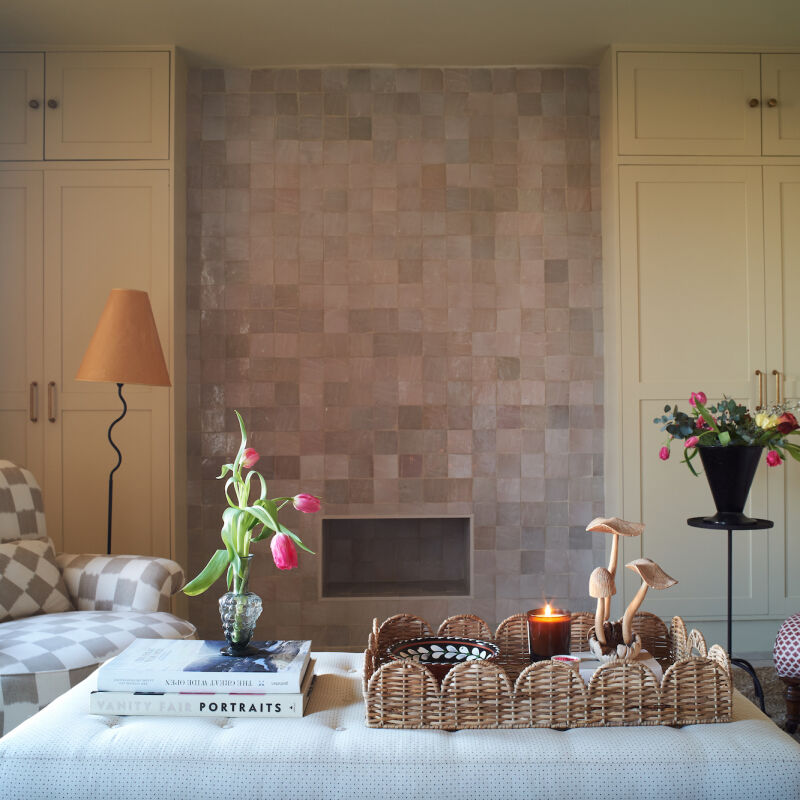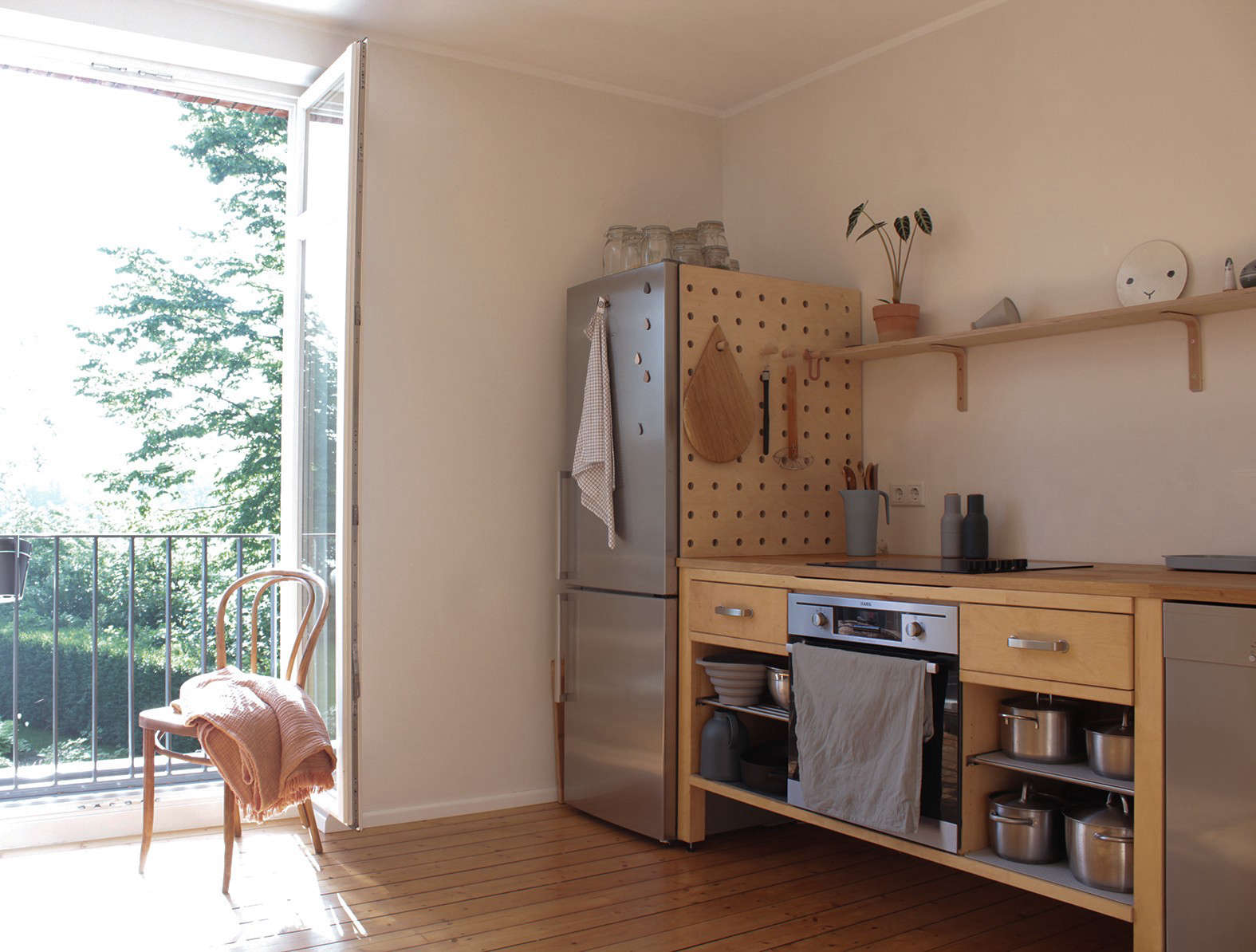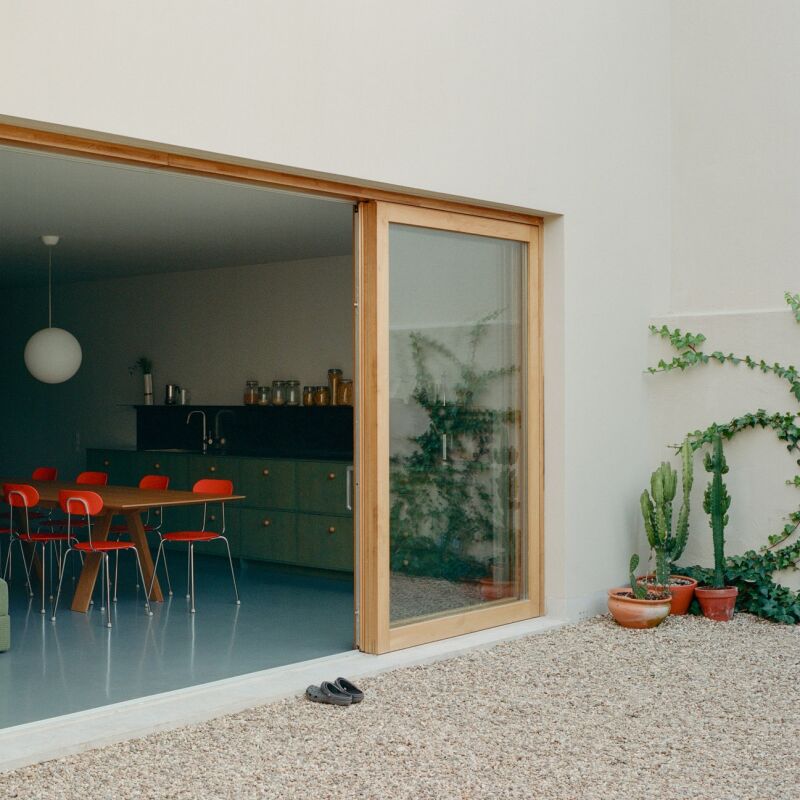Joan Barton describes herself as “a general contractor and artist.” The owner of Dirty Girl Construction in Los Angeles, Barton has a background in music—she arrived in Hollywood as a composer—and says that design and building apply surprisingly well to her skill set: “Obsessive attention to detail, a mind for innovation, and a math bent come in handy on construction sites.” She has been one of the lone women in her field since 2008 and has worked on a wide variety of house remodels and new constructions.
A discovery along the way is that flooring, the underpinning of every project, often walks away with a bigger chunk of the budget than necessary: “Macassar ebony and marble mosaic may be out of the question, but you don’t need to break the bank for the floor you’re after,” says Joan. Here are her favorite cost-effective options.
Above: In her Victorian townhouse in SF, children’s clothing designer Dagmar Daley saved money by exposing and refurbishing the Douglas fir subfloor and matching it where necessary. Tour her kitchen in the Remodelista book and her disappearing home office here. Photograph by Matthew Williams.
1. Reclaim Your Subfloor
Low-down: Take a look at what’s beneath your finished flooring. Especially in older homes, there’s often a good-quality wood structural subfloor that can be upgraded—holes sanded, gaps filled with wood flour cement, and the overall stained and sealed—to great effect. In other words, you could be standing on a gold mine you didn’t know you had.
Price Tag: If you’re doing this work yourself, expect to spend about $1 per square foot to cover materials and machine rentals, a week or two of prep labor, and three days spent staining and sealing. If you’re hiring a flooring contractor, approximate cost is $5 per square foot for a finished floor. Word of advice: Be 100 percent sure that you or your flooring contractor read all the product and process safety precautions before using wood flour cement; these products are highly flammable and must be used per the industry guidelines.
If you aren’t lucky enough to find a gem of a floor beneath layers of age-old linoleum, then you can consider buying reclaimed products. The price of reclaimed lumber material is $5 to $35 per square foot depending on what species you purchase, where it’s coming from, what shape it’s in, and whether it has been milled, cleaned, and kiln-dried. Be cautious: Thanks to the surge in popularity of reclaimed lumber, some sellers make false claims about the source of their products to earn a quick buck. You can make sure your lumber is truly reclaimed by purchasing it from a dealer who offers certifications from organizations such as the Forest Stewardship Council and the Rainforest Alliance.

Above: Dirty Girl Construction used marine paint to create a glossy floor for antiques gallery Obsolete’s Culver City showroom.
2. Apply Marine Paint to Concrete and Wood Flooring
Low-down: Painted floors can be quite glamorous. We use them in a range of settings from lofts and art galleries to small spaces—thanks to the reflective properties of high-gloss, painted floors increase the depth and light of the room. Once you’ve cleaned and prepped your slab or sanded your hardwood, the job is simple: Apply two coats of primer and two coats of paint. We like the gleaming, hard-wearing marine paint sold at most boat maintenance stores and online; our local source is West Marine, which has stores all over the country. We’ve been using Interlux Brightside Polyurethane at their recommendation with impressive and long-lasting results.
Price Tag: The average cost for professionally grinding, staining, and polishing a concrete floor in residential homes runs around $7 to $12 per square foot, and refinishing a wood floor is $6 to $9. That’s the essential prep work. Marine gloss paints run anywhere from $50 to $150 per gallon, and to have your floors professionally painted costs roughly $4 per square foot on a wood floor and $5.50 per square foot on concrete. You can save by doing this work yourself, but if you don’t know how to grind concrete or sand a floor, hire a professional, and then tackle the painting yourself. It’ll cost a bit more per square foot for the outside help, but it’ll save you a lot of headache—and it costs more to hire pros to fix your mistakes than to have them do the work from the get-go.

Above: A space-enhancing painted floor in Ann Stephenson and Lori Scacco’s tiny A-frame on Fire Island. To see more, go to Reader Rehab: A Chic Fixer-Upper. Photograph by Kate Sears.

Above: Lustrous marine blue floors at Kin Kao Thai Kitchen in Toronto designed by Scott & Scott Architects.
3. Stain Dowdy Wood Floors Gray
Low-down: Silvery gray floors have been cropping up all over in the past few years. Whether reclaimed or engineered, they don’t come cheap—some that my clients have been tempted by run about $20 per square foot just for materials. So, rather than replacing wood flooring, my team and I have been sanding and bleaching existing surfaces and creating an array of finishes with European products, such as Rubio Monocoat. The stains and bases run about $1 per square foot per product, and we typically use two to three different stain-base combos to create our colors. The process can be labor intensive for first-timers, and I’d be remiss if I failed to mention that refinishing any hardwood floor to gray is a challenging mission. Every wood species takes stain differently because of undertones and graining, and you can end up with a brown, green, or purple floor that looks painted and streaky. A safer bet is to hire an expert well-versed not only in refinishing, but the techniques used to achieve a gray wood floor.
Price Tag: Expect to pay $3 to $5 per square foot for labor depending on the existing condition and desired color of your floors. If you want to give this a try yourself, read about it in detail and then practice the processes on sample boards before trying it on your actual floor. And if you’re tired of looking at sample boards in shades of lavender, call a recommended contractor.

Above: By bleaching the existing red oak floor and applying a penetrating stain, Dirty Girl Construction introduced a much more interesting silvery finish.
4. Use Porcelain Tiles that Mimic Wood Plank Flooring
Low-down: A few years back, I balked at the notion of faux wood porcelain tile, but thanks to advancements in technology and manufacturing, they’re now a standard consideration. Porcelain flooring comes in a wide range of shapes, colors, textures, and finishes—chances are good, you’ve walked on it and assumed it was wood. The advantages? In addition to being less expensive, porcelain is easier to clean than wood as well as scratch- and moisture-resistant, and it will keep your home cooler during the summer months. When you want the look of wide-plank, whitewashed wood without the upkeep, this material is very realistic and a great substitute.
At the moment, I’m a big fan of the In-Essence line by Provenza Ceramiche that I buy from Stone Source in Los Angeles. You can also find plank tile lines at Home Depot, Lowe’s, and Daltile.
Price Tag: Tile costs range from $2.50 to $9.50 per square foot depending on size and color selection. (By comparison, good-quality, wide-plank wood flooring is $12 to $40 per square foot; you can find examples for less than that, but you get what you pay for.) Whether you know how to install tile or are outsourcing to a pro, be aware that porcelain is heavy and dense, so cutting and setting the tile is like working with stone—but it’s also as durable. Installation for horizontal tile is $10 to $15 per square foot, while vertical tile setting runs between $20 to $26 per square foot. And when ordering longer lengths, it’s advisable to get an extra 18 percent (instead of the usual 10 percent extra for tiles) to cover breakage in shipping and waste from cutoffs.

Above: Looks like Scandi-style whitewashed wood flooring, but it’s actually porcelain tile in a London remodel by Jamie Blake of Blakes London. See Steal This Look: The Endless Summer Kitchen.
Go to our Flooring archive for more tips, including:
- 5 Things to Know About Radiant Floor Heating
- Remodeling 101: The Mysteries of Bamboo Floors Revealed
- Affordable and Environmentally Friendly Linoleum
- DIY: Dramatic Floor Stencils
N.B.: This post is an update; the original story ran on April 29, 2016.





Have a Question or Comment About This Post?
Join the conversation (1)